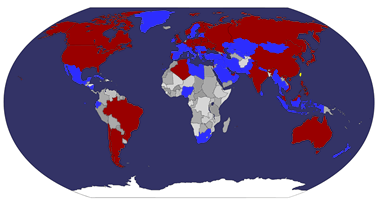

The Southern African Development Community (SADC) is an inter-governmental organization headquartered in Gaborone, Botswana. Its goal is to further socio-economic cooperation and integration as well as political and security cooperation among 15 southern African states. It complements the role of the African Union.
The origins of SADC lie in the 1960s and 1970s, when the leaders of majority-ruled countries and national liberation movements coordinated their political, diplomatic and military struggles to bring an end to colonial and white-minority rule in southern Africa. The immediate forerunner of the political and security cooperation leg of today's SADC was the informal Front Line States (FLS) grouping. It was formed in 1980.
The Southern African Development Coordination Conference (SADCC) was the forerunner of the socio-economic cooperation leg of today's SADC. The adoption by nine majority-ruled southern African countries of the Lusaka declaration on 1 April 1980 paved the way for the formal establishment of SADCC in April 1980.
Membership of the FLS and SADCC sometimes differed.
SADCC was transformed into SADC on 17 August 1992, with the adoption by the founding members of SADCC and newly independent Namibia of the Windhoek declaration and treaty establishing SADC. The 1992 SADC provided for both socio-economic cooperation and political and security cooperation. In reality, the FLS was dissolved only in 1994, after South Africa's first democratic elections. Subsequent efforts to place political and security cooperation on a firm institutional footing under SADC's umbrella failed.
On 14 August 2001, the 1992 SADC treaty was amended. The amendment heralded the overhaul of the structures, policies and procedures of SADC, a process which is ongoing. One of the changes is that political and security cooperation is institutionalised in the Organ on Politics, Defence and Security (OPDS). One of the principal SADC bodies, it is subject to the oversight of the organisation's supreme body, the Summit, which comprises the heads of state or government.
In 2008, the SADC agreed to establish a free trade zone with the East African Community (EAC) and the Common Market of Eastern and Southern Africa (COMESA) including all members of each of the organizations.
Since 2000 began the formation of the SADC Free trade area with the participation of the SACU countries (South Africa, Botswana, Lesotho, Namibia, and Swaziland). Next to join were Mauritius, Zimbabwe, and Madagascar. In 2008 joined Malawi, Mozambique, Tanzania, and Zambia bringing the total number of SADC FTA members to 12. Angola, DR Congo and Seychelles are not yet participating.










.jpg)






















 taiwan
taiwan  cover or postcard
cover or postcard  FDC
FDC 






























































































No comments:
Post a Comment